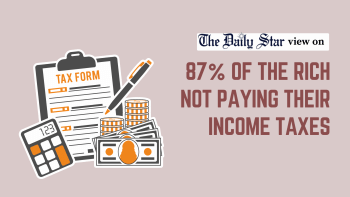Why the proposal to tax social events is ridiculous

Bangladesh's tax collection has long been a concern. The country maintains a low tax-GDP ratio of 8 percent, ranking as the second-lowest in South Asia and lagging behind lower-middle-income countries by nearly 5 percent. Despite efforts by the National Board of Revenue (NBR) to boost revenue generation, challenges persist. Recently, a proposal by the Institute of Cost and Management Accountants of Bangladesh (ICMAB) to tax social events has stirred controversy and raised questions about the effectiveness and fairness of tax policies.
The proposal made by ICMAB is to apply taxes to the hosts for organising various social events except for business purposes, including bridal showers, birthdays, or wedding anniversaries at hotels, restaurants, or community centres. Under this proposal, ICMAB recommends levying a tax of Tk 50 for each additional guest beyond the threshold of 100 attendees. The primary objective of this proposal is to broaden the tax base by encompassing a larger segment of the population participating in social events, thereby bolstering overall tax collection efforts.
The proposal by ICMAB to tax social events is both ridiculous and ironic. It overlooks the fundamental principle of taxation. According to "THE INCOME TAX ORDINANCE, 1984 (XXXVI OF 1984) and INCOME TAX RULES, 1984," income tax is imposed based on ability to pay. "The more a taxpayer earns the more he should pay," is the basic principle of charging income tax. Thus, taxation should be tied to the benefits provided by the government, not arbitrary expenditures made by individuals. Additionally, taxing social events would not only fail to significantly boost revenue but could also disrupt economic activity and discourage spending.
Primarily, the question arises: What justifies taxation? Taxation traditionally correlates with the benefits citizens receive in return. The pertinent inquiry remains: What tangible benefits does the country furnish when an individual host a social gathering? It is incumbent upon the state to offer commensurate benefits to justify tax imposition. Secondly, inviting guests to social events incurs expenditures. Yet, should taxation be levied merely on account of citizens' expenditures? Such imposition risks failing to bolster government revenue and potentially disrupting economic equilibrium.
Implementing such a tax would introduce complexities regarding its classification and administration. Moreover, it could discourage individuals from spending on special occasions, thereby negatively impacting industries like event management. Instead of targeting individuals, a more effective approach would be to incentivise event management companies' registration and tax filing, tapping into their significant revenue potential.
Presently, Bangladesh boasts a total of 1,383 event management companies. The profitability of such companies cannot be overlooked, rendering their revenue stream a viable source of taxable income. By targeting this sector, substantial revenue gains can be realised, exemplified by the wedding industry alone, valued at a remarkable Tk 2,000 crore market. A modest 5 percent tax collection from this industry could translate to a noteworthy addition of Tk 100 crore to government coffers.
A more advantageous approach for the National Board of Revenue (NBR) would be to prioritise the tax compliance of these entities. Offering incentives for event management companies to register and fulfil tax obligations would contribute to revenue augmentation and fortify the industry's resilience.
Regrettably, the current focus appears misplaced. Furthermore, compelling companies to adhere to tax filing procedures is inherently more practicable than targeting individual taxpayers, especially considering the dismal tax return filing rate, with over 63 percent of Taxpayer Identification Number (TIN) holders failing to fulfil their obligations in the current fiscal year.
According to provisional data by the NBR, the tax collector logged Tk 165,630 crore in total revenue in the July-December period of the current fiscal year, surpassing the IMF's indicative targets of Tk 143,640 crore for the same period. While this achievement reflects commendable efforts by the NBR in revenue generation, there remains a gap as the tax collector fell short of its own target by over Tk 23,200 crore. As analysts suggest, achieving this target would enable the government to curtail bank borrowing, thereby meeting public expenditure needs more effectively.
Amidst these challenges, it's heartening to witness the NBR's dedication to enhancing the nation's revenue streams. However, the NBR must ensure that its taxation efforts do not inadvertently impede economic growth or dampen the spirit of development among the populace. Much like its decision to implement a uniform tax rate for all exporters to promote various industries beyond the ready-made garment sector, the NBR must adopt innovative strategies in policy formulation.
Sectors like freelancing and wedding planning offer good chances for the NBR to get more taxes. However, before imposing taxes, the NBR should think about what benefits they can give to freelancers and event managers who pay taxes. If the NBR can offer extra services that show the difference between taxpayers and non-taxpayers, then the industry will see more taxes coming in. This will help increase tax revenue while also supporting the growth of these industries.
As Bangladesh seeks to reduce reliance on external funds and increase domestic revenue generation, tax policies must be carefully crafted to promote equity, economic growth, and compliance. The recent proposal to tax social events highlights the need for greater rationality and innovation in tax policy formulation. By prioritising incentives for tax compliance among businesses and individuals, Bangladesh can unlock its full revenue potential while fostering a conducive environment for economic development.
Anik Dey has completed his BBA and MBA from the Department of Finance, University of Dhaka, and is currently working as an independent researcher.
Views expressed in this article are the author's own.
Follow The Daily Star Opinion on Facebook for the latest opinions, commentaries and analyses by experts and professionals. To contribute your article or letter to The Daily Star Opinion, see our guidelines for submission.

 For all latest news, follow The Daily Star's Google News channel.
For all latest news, follow The Daily Star's Google News channel. 





Comments